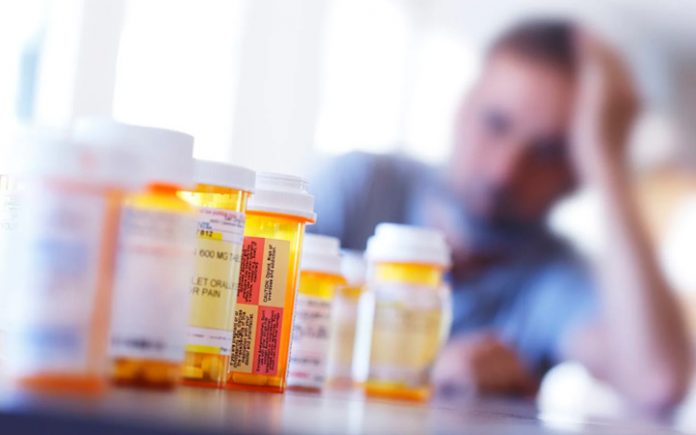Last Updated on April 20, 2021
Are you one of those people who follow a healthy and balanced diet and exercise regularly but still can’t lose weight? This is more common than you think. And it affects you as well as thousands of other people around the world.
But why does that happen? It is because there are things that interfere with weight gain in addition to physical exercise and good nutrition, as is the case with medications. What medications cause weight gain? Here are the 7 main medications that may be causing you to gain weight.
But be careful: don’t stop taking them just because they represent the causes of weight gain or big appetite – they may even be saving your life or helping to tackle a serious health problem. Click to get to know them with more!
1. Contraceptive Medications: Depo-Provera and Yasmin
Birth control pills help in the production of progesterone – a steroid hormone that prepares women for pregnancy, but which can also lead to weight gain. Do birth control pills cause weight gain?
Yes, there are contraceptives such as Depo-Provera and Yasmin that have higher doses of progesterone and, as a rule, these lead to greater weight gain.
In addition, it should also be noted that oral contraceptives can cause fluid retention (a phenomenon known as dreaded belly bloat), which makes you feel more bloated and heavier – even if it is just water.
To overcome this difficulty and without gaining extra weight, it is recommended that you talk to your gynecologist about the best contraceptive drugs with low doses of progesterone. Or you should consider other ways to control birth rates, such as the placement of an IUD, among other equally effective options.
2. Beta-blocking Medicines: Lopressor, Angipress, and Inderal
Beta-blockers are the drugs used to treat high blood pressure or hypertension. This hypertension medication is therefore extremely effective in combating diabetes, in treating kidney failure and even for those who are prone to suffering from heart attacks.
The older beta-blockers, such as the Lopressor, Angipress, Inderal, among others, are among the most effective, as they effectively lower your heart rate and also your metabolic rate. This causes the burning of calories in the body to be slower, which leads to an increase in weight.
Of course, it is advisable that you follow a healthy and well-regulated lifestyle with a balanced diet rich in nutrients.
But, talk to your family doctor to see if it is possible to adopt other alternatives, such as the intake of calcium channel blockers, alpha, and mixed beta-blockers, among other options, so that your body weight does not increase.
3. Diabetes Drugs: Diabinese, Starlix, and Novonorm
Diabetes medications, namely type 2 diabetes, aim to regulate insulin levels in the body. Of the best known, Diabinese, Starlix and Novonorm stand out. These are the most effective diabetes drugs for diabetics to deal with high blood glucose levels, but their intake also causes an increase in appetite that you must control.
This is one of the most common and difficult diseases to treat in adults because it has side effects of weight gain in people who already have to live with weight problems. The treatment itself so as not to put on weight causes the patient to put on weight.
In this specific case, the best solution is regular physical exercise. A 30-minute walk a day can work miracles for your body. Force yourself to make physical efforts, because only then will you have a better quality of life.
You can also talk to your doctor about opting for other types of insulin – Levemir is one that has the fewest side effects. See what the doctor tells you about this alternative.
4. Antihistamines: Allegra and Benadryl
Antihistamine drugs such as Allegra and Benadryl can be taken sporadically to fight allergies for example. And, in fact, it is always recommended that you have an antihistamine in your pharmacy at home because it may be needed at any time.
However, you should not take antihistamines every day in the medium or long term, as this leads to a huge weight gain. This is because by blocking the action of histamine in the brain, the antihistamine disrupts and stimulates hunger, making your body feel unfulfilled.
There are nasal sprays that have more localized effects and that can be a good alternative to this anti-anxiety treatment. There are also antihistamine drugs, such as Zyrtec and Claritin that are not so linked to weight gain. Talk to your doctor to find out which option is best for you.
5. Corticosteroid Drugs: Prednisone, Predicorten, and Predsin
Corticosteroid drugs can be administered via injection or orally and they are widely used in diseases of the skin, blood, and arthritis, namely in the treatment of inflammatory and autoimmune processes.
Which drugs can cause weight gain? Prednisone, Predicorten, and Predsin, among other types of steroid medication, are known for their weight gain effects when used in high doses or for long periods of time, as they increase appetite and fluid retention. In addition, they tend to cause insomnia, which impairs the quality of your sleep and rest.
The best solution in this situation is to have an open conversation with your family doctor about the dosage you are taking. Check if there are lower or shorter doses that are as or more effective.
Treat insomnia with Sominex, Unisom, and Nytol
Regarding the poor quality of your sleep and the treatment of insomnia, sleeping pills Sominex, Unisom and Nytol, among others of the kind, are also associated with weight gain.
Therefore, do not start taking medication to sleep better in order to decrease the dosage of corticosteroids, for example. You may even think you are helping in a way, but you may be doing a lot worse.
6. Antidepressant Medicines: Paxil, Prozac, and Celexa
The antidepressant drugs like Paxil, Prozac, and Celexa are known to be selective serotonin reuptake inhibitors (SSRI) and they are responsible for the weight gain in the human body.
This is because the absorption of serotonin (the hormone of pleasure and happiness) by the brain causes you to have a greater appetite, desire to eat and a better general disposition, contributing to an overall increase in weight. This, in theory, is great.
But in practice, the depressed person will be even more depressed when he sees that he is gaining weight and losing his silhouette – this is one of the most visible symptoms of depression.
The side effects of antidepressant drugs vary from person to person and even in the list of contraindications on the product packaging, there is information that weight gain and loss can be common effects. In this particular situation, you can only find the most appropriate antidepressant for you through trial and error.
Stabilize the mood: Carbolitium and Depakote
Mood stabilizers, such as Carbolitium, Depakote, among others, can be an excellent alternative for those who are constantly sad and down.
This anxiety medication is widely used to treat schizophrenia and other types of bipolar disorders, but it also leads to a weight gain problem. In fact, one of the Depakote side effects is excessive weight gain because the body always feels the need to eat compulsively.
Migraine treatment: Depakote and Neurontin
Associated with the malaise and fragility of the mind, namely the treatment of migraines and mood breaks, Depakote and Neurontin are the most prescribed nerve pain drugs. However, their intake leads to weight gain (tricyclic antidepressants, together with antiseptic drugs and medication for hypertension are the biggest culprits).
It is preferable to discover and treat what triggers migraine (coffee at night, a glass of wine at dinner, eating wheat flour, among others) and remove this eating habit from your diet rather than clogging yourself with medication.
7. Antipsychotic Medications: Olanzapine, Clozapine, and Risperidone
From the list of medications that cause weight gain, antipsychotics are the ones that most contribute to the cause. Olanzapine, Clozapine, and Risperidone are extremely effective in treating schizophrenia and psychosis but lead to considerable weight gain.
These atypical antipsychotics are very similar to antidepressants and the impact of this bipolar disorder medication is believed to directly interfere with appetite control and the metabolism of each patient. It slows you down and takes longer, leading to less calorie wear and weight gain.
Those were the 7 drugs that may be causing you to gain weight and that you probably didn’t know. Talk to your family doctor to find the best solutions for your health problem without you gaining any additional weight.

































